英语倒装句的几种情况
倒装句的用法总结

倒装句的用法总结倒装句在英语语法中属于一种特殊句型,它能够使语言表达更加灵活多样。
倒装句的用法有时会让人感到困惑,因此本文将对倒装句的基本形式、用途及注意事项进行总结和解释。
一、什么是倒装句?倒装句是指将英语中主语和谓语动词的位置颠倒的现象。
通常来说,在陈述句中主语位于谓语动词之前;但在某些情况下,为了强调某个信息或改变语气,可以将主语和谓语动词颠倒顺序。
二、基本形式1. 完全倒装:即将助动词、情态动词或连系动词放在主语之前。
Examples:- Had she arrived?(她到了吗?)- Can you swim?(你会游泳吗?)- Is it a cat?(那是一只猫吗?)2. 部分倒装:即将助动词、情态动词或连系动词与其后面的其他成分颠倒顺序。
Examples:- Not only did he finish his homework, but also he helped his classmates.(他不仅完成了作业,还帮助了同学们)- At no time does he admitted his mistakes.(他从未承认过他的错误)三、倒装句的用途1. 当以否定词开头表达“部分否定”的意思时,常常使用完全倒装。
Example:- Never have I seen such a beautiful sunset.(我从未见过如此美丽的日落)2. 在虚拟条件句中,通常采用部分倒装。
Example:- Should you need any assistance, please let me know.(如果你需要任何帮助,请告诉我)3. 在介词短语置于句首时,为了避免重复或强调信息,可以使用完全或部分倒装。
Examples:- Off the table fell a plate.(桌子上掉下了一只盘子)- Into the room walked a toddler and her mother.(一个蹒跚学步的小孩和她的妈妈走进了房间)四、注意事项1. 只有助动词、情态动词和连系动词才能发生倒装。
详析英语倒装句的六种类型

详析英语倒装句的六种类型英语句子使用的目的,可分为四大类:陈述句、疑问句、祈使句和感叹句。
这四大类型句子都有可能出现倒装句。
倒装句分为全倒装和部分倒装两种类型。
浅析如下:一、疑问句中出现的倒装句1. 特殊疑问句中(1)What is this?(全倒装)这是什么?(2)Which do you want?(部分倒装)你想要哪一件?+2. 一般疑问句(1)Do you study English every day?(部分倒装)你每天学习英语吗?(2)May I come in? 我能进来吗?(3)Are you going to be a teacher? 你打算做一名老师吗?【注意】:1.特殊疑问句中,如果疑问词做主语或疑问词修饰主语时,句子不用倒装,即用陈述语序。
例如:Who did it yesterday? Which guy can do this work?2.一般疑问句中,常把助动词或情态动词放在句首,即位于主语前,而构成部分倒装。
二、感叹句中出现倒装句1. What引导的感叹句(1)What a happy life we have had!(宾语在主语前面) 我们过着多么幸福的生活啊!(2)What a fine day it is!(表语在主语前面)今天的天气多好啊!(3)What a shining example Comrade Lei Feng has set us! 雷锋同志给我们树了多好的榜样啊!2. How引导的感叹句(1)How happy we are!(表语在前面)我们多么高兴啊!(2)How hard they are working!(状语在前面)他们工作地多么努力啊!(3)How nice a day it is! 多么好的天气啊!3. 副词引导词引导的感叹句(1)There comes the bus! 汽车来了!(2)In come the students! 学生进来了!(3)Off goes the worker! 工人下车了!【注意】:1. What或how 引导的句子,主谓也有不倒装的。
英语中的倒装句

2.句子的开头是here,there ,now, then等副词。如: 1)Here are some interesting stories for you to read 这儿有些有趣的故事给你读。 2)There goes the bell. 铃声响了。
3.表示方位的介词、副词放在句首。如: out,in,up,down,away等词。但应注 意:句子的主语应是名词,若主语是代词, 则不能倒装。如: 1)Out rushed the soldiers. 战士们冲了出去。 2)Away went the boy. 那男孩走开了。 请比较: 3)Away he went.他走开了。 4)Here he comes.他来了。
5.副词often,短语many a time,或者 so修饰形容词或副词、位于句首时。例如: 1) So badly was he injured in the accident that he was sent to the hospital for treatment. 在这次事故中他伤得很重,被送进医 院治疗。 2)So hard does he work that he has no time to spare for travelling. 他那么努力工作,抽不出时间去旅行。
英语中的倒装句
英语最基本的语序是主语在前,谓语 动词在后。但有时由于句子结构的需 要或表示强调,就要采用倒装形式。 将谓语动词完全移到主语之前称为完 全倒装,只将助动词或情态动词放到 主语之前称为部分倒装。
一、几种常见的部分倒装结构: 1.Only+状语或者状语从句放在 句首。如: Only in this way can we improve our English. 只有这样,我们才能提高英语水平。 Only after you left did l find this bag. 只是在你离开以后我才发现这只提包。
高中英语倒装句的归纳总结

高中英语倒装句的归纳总结倒装句是英语中的一种特殊语法结构,通常在句子中,主语和谓语动词的位置是固定的,即主语在前,谓语动词在后。
然而,在某些情况下,为了强调句子中的某个成分,或者为了满足特定的语法要求,我们需要将主语和谓语动词的位置颠倒,这就是倒装句。
倒装句在高中英语中经常出现,因此对其进行归纳总结具有重要的意义。
一、全部倒装全部倒装是指句子中的主语和谓语动词完全颠倒的情况,常见于以下几种情况:1. 在以副词here, there或者out, in等表示地点的副词开始的句子中,常常采用全部倒装。
Here comes the bus.(汽车来了。
)There goes the bell.(铃声响了。
)Out rushed the children.(孩子们冲了出去。
)2. 在以表示方向的副词和介词短语开头的句子中,常采用全部倒装。
Down went the sun.(太阳下山了。
)In came the teacher.(老师进来了。
)3. 在以表示否定意义的副词或副词短语开头的句子中,常采用全部倒装。
Never have I seen such a beautiful view.(我从未见过如此美景。
)Not only does he play basketball, but he also plays football.(他不仅打篮球,还踢足球。
)二、部分倒装部分倒装是指只将谓语动词和助动词或情态动词提到主语之前,而将其他成分保持原来顺序的情况。
常见的部分倒装有以下几种情况:1. 在以表示否定意义的副词或副词短语位于句首时,动词与主语之间采用部分倒装。
Never have I been to Paris.(我从未去过巴黎。
)Hardly had she finished her speech when they clapped.(她刚刚讲完演讲就被他们鼓掌了。
)2. 在以so和neither引导的倒装句中,动词与主语之间采用部分倒装。
英语倒装句12种类型及例句
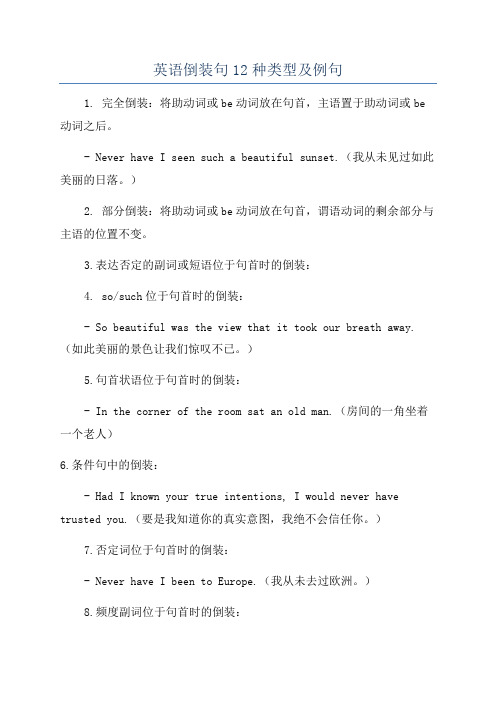
英语倒装句12种类型及例句1. 完全倒装:将助动词或be动词放在句首,主语置于助动词或be 动词之后。
- Never have I seen such a beautiful sunset.(我从未见过如此美丽的日落。
)2. 部分倒装:将助动词或be动词放在句首,谓语动词的剩余部分与主语的位置不变。
3.表达否定的副词或短语位于句首时的倒装:4. so/such位于句首时的倒装:- So beautiful was the view that it took our breath away.(如此美丽的景色让我们惊叹不已。
)5.句首状语位于句首时的倒装:- In the corner of the room sat an old man.(房间的一角坐着一个老人)6.条件句中的倒装:- Had I known your true intentions, I would never have trusted you.(要是我知道你的真实意图,我绝不会信任你。
)7.否定词位于句首时的倒装:- Never have I been to Europe.(我从未去过欧洲。
)8.频度副词位于句首时的倒装:- Rarely do we see such dedication.(我们很少见到如此的奉献精神。
)9.祈使句或祈使句部分的倒装:- Stand up!(站起来!)- Be quiet, please.(请安静。
)10. only位于句首时的倒装:- Only by working hard can you achieve your goals.(只有通过努力工作,你才能实现目标。
)11.地点状语置于句首时的倒装:- In the garden were beautiful flowers.(花园里有美丽的花朵。
)12.宾语置于句首时的倒装:- A love like this I have never felt before.(我之前从未感受过如此的爱。
英语倒装句12种类型及例句
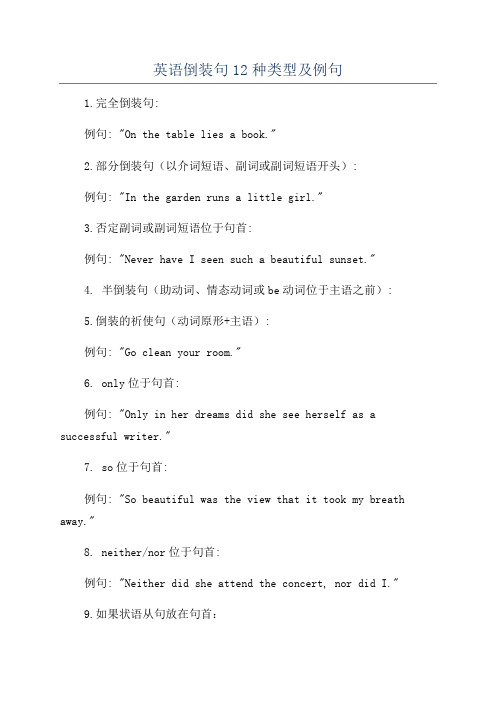
英语倒装句12种类型及例句1.完全倒装句:例句: "On the table lies a book."2.部分倒装句(以介词短语、副词或副词短语开头):例句: "In the garden runs a little girl."3.否定副词或副词短语位于句首:例句: "Never have I seen such a beautiful sunset."4. 半倒装句(助动词、情态动词或be动词位于主语之前):5.倒装的祈使句(动词原形+主语):例句: "Go clean your room."6. only位于句首:例句: "Only in her dreams did she see herself as a successful writer."7. so位于句首:例句: "So beautiful was the view that it took my breath away."8. neither/nor位于句首:例句: "Neither did she attend the concert, nor did I."9.如果状语从句放在句首:10.条件从句位于句首:例句: "Should he fail the exam, he will have to retake the course."11.介词短语或副词短语位于句首:例句: "In the corner sat a small dog."12. or/ nor引导的短语或句子位于句首:。
英语倒装句12种类型
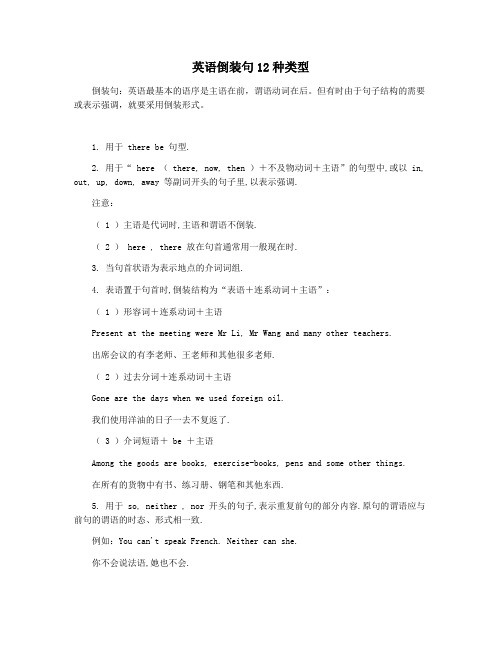
英语倒装句12种类型倒装句:英语最基本的语序是主语在前,谓语动词在后。
但有时由于句子结构的需要或表示强调,就要采用倒装形式。
1. 用于 there be 句型.2. 用于“ here ( there, now, then )+不及物动词+主语”的句型中,或以 in, out, up, down, away 等副词开头的句子里,以表示强调.注意:( 1 )主语是代词时,主语和谓语不倒装.( 2 ) here , there 放在句首通常用一般现在时.3. 当句首状语为表示地点的介词词组.4. 表语置于句首时,倒装结构为“表语+连系动词+主语”:( 1 )形容词+连系动词+主语Present at the meeting were Mr Li, Mr Wang and many other teachers.出席会议的有李老师、王老师和其他很多老师.( 2 )过去分词+连系动词+主语Gone are the days when we used foreign oil.我们使用洋油的日子一去不复返了.( 3 )介词短语+ be +主语Among the goods are books, exercise-books, pens and some other things.在所有的货物中有书、练习册、钢笔和其他东西.5. 用于 so, neither , nor 开头的句子,表示重复前句的部分内容.原句的谓语应与前句的谓语的时态、形式相一致.例如:You can't speak French. Neither can she.你不会说法语,她也不会.6. 为了保持句子平衡,或为了强调表语或状语,或是上下文紧密衔接时.例如: They arrived at a small village, in front of which was a big river.他们来到一个小村庄,村庄前面是条大河.1. 否定副词位于句首时的倒装在正式文体中,never, seldom, rarely, little, hardly, scarcely, no sooner, no longer, nowhere 等含有否定意义的副词若位于句首,则其后要用部分倒装:I shall never forgive him. / Never shall I forgive him. 我永远不会宽恕他。
英语语法“完全倒装”的四种类型

外教一对一英语语法“完全倒装”的四种类型英语语法“完全倒装”的基本形式是“谓语+主语”,主要涉及以下几种类型:一、here类当表示地点的here和 there位于句首时,其后用完全倒装形式。
这类倒装句的谓语通常是动词be和come, go等表示移动或动态的不及物动词。
如:Here’s Tom. 汤姆在这里。
There’s Jim. 吉姆在那儿。
Here comes the bus. 公共汽车来了。
There goes the bell. 铃响了。
There goes the last train. 最后一班火车开走了。
这类倒装句的主语只能是名词,若主语为代词,则不能倒装。
如:Here it comes. 它来了。
二、away类副词away, down, in, off, out, over, round, up 等位于句首时,其后也用完全倒装语序。
这类倒装句的谓语通常表示动态的不及物动词。
如:外教一对一 Away went the runners. 赛跑选手们跑远了。
Round and round flew the plane. 飞机盘旋着。
The door opened and in came Mr Smith. 门开了,史密斯先生进了来。
Down came the rain and up went the umbrellas. 下雨了,伞都撑起来了。
这类倒装句的主语也只能是名词,若主语为代词,则不用倒装。
如:Away he went. 他跑远了。
Down it came. 它掉了下来。
三、状语或表语类为了保持句子平衡或使上下文衔接紧密,有时可将状语或表语置于句首,句中主语和谓语完全倒装。
如:Among these people was his friend Jim. 他的朋友吉姆就在这些人当中。
By the window sat a young man with a magazine in his hand. 窗户边坐着一个年轻人,手里拿着一本杂志。
英语倒装句的几种情况

英语倒装句的几种情况按“主语+ 谓语” 这种顺序排列的句子是陈述语序。
如果排列顺序变为“谓语(或谓语一部分)+主语”,就是倒装。
倒装句分为:完全倒装:整个谓语移至主语前面叫完全倒装。
部分倒装:只把助动词、系动词或情态动词放在主语之前叫部分倒装。
一.完全倒装1. There be + 主语+地点。
另外,在此结构中可以用来代替be动词的动词有:exist, seem, happen, appear, rise, stand等。
如:There stood a dog before him.There are many different kinds of mooncakes on the table .2.Here, There, Now, Then + come (或be等) + 主语" 结构。
主语是人称代词时,不必倒装。
There是引导词,本身没意义。
There comes the bus.Then came the day we are looking forward to.**Here you are! There they come!**3. 表示方位的副词或短语out, in, up, down,away放在句首,后面一般使用倒装语序。
这种句子的为主动词通常为go, come, rush, fly ,fall.. 主语是人称代词时,不必倒装。
In came our teacher.4. 表示地点的介词短语(如on the wall, under the tree, in front of the house, in the middle of the room等)放在句首时,要全部倒装。
如:On the top of the hill stands a pine tree.In front of the classroom is a playground.5. 如果直接引语后注明是什么人说的,而且主语是名词时,需要完全倒装;主语是人称代词时,一般不用倒装。
倒装句七种英语结构
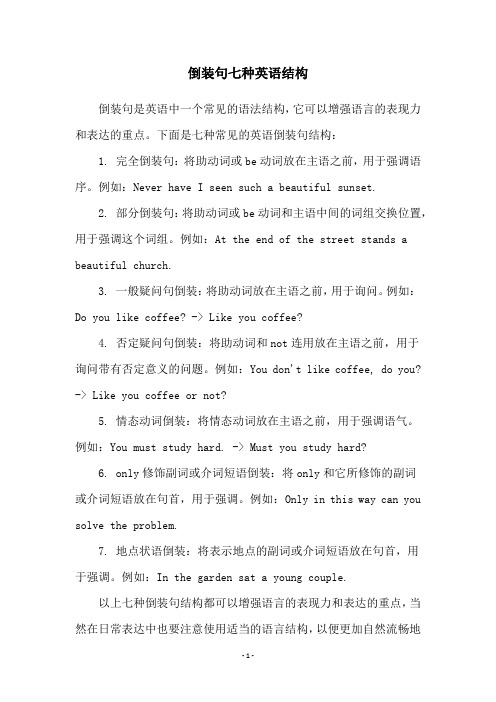
倒装句七种英语结构倒装句是英语中一个常见的语法结构,它可以增强语言的表现力和表达的重点。
下面是七种常见的英语倒装句结构:1. 完全倒装句:将助动词或be动词放在主语之前,用于强调语序。
例如:Never have I seen such a beautiful sunset.2. 部分倒装句:将助动词或be动词和主语中间的词组交换位置,用于强调这个词组。
例如:At the end of the street stands a beautiful church.3. 一般疑问句倒装:将助动词放在主语之前,用于询问。
例如:Do you like coffee? -> Like you coffee?4. 否定疑问句倒装:将助动词和not连用放在主语之前,用于询问带有否定意义的问题。
例如:You don't like coffee, do you? -> Like you coffee or not?5. 情态动词倒装:将情态动词放在主语之前,用于强调语气。
例如:You must study hard. -> Must you study hard?6. only修饰副词或介词短语倒装:将only和它所修饰的副词或介词短语放在句首,用于强调。
例如:Only in this way can you solve the problem.7. 地点状语倒装:将表示地点的副词或介词短语放在句首,用于强调。
例如:In the garden sat a young couple.以上七种倒装句结构都可以增强语言的表现力和表达的重点,当然在日常表达中也要注意使用适当的语言结构,以便更加自然流畅地表达意思。
倒装句用法知识点总结

倒装句用法知识点总结倒装句是英语语法中的一种特殊句型,通过改变主谓语序,使得句子结构更加灵活且具有强调的效果。
在英语中,倒装句常见于疑问句、条件句、以及某些特定情况下。
本文将对倒装句的用法进行总结和归纳。
一、全倒装句全倒装句是指将助动词或情态动词放在主语之前,与否定词或者表示否定意义的副词连用。
全倒装句的结构如下:1. 在一般疑问句中,将助动词放在主语之前。
例如:- Do you like apples? (你喜欢苹果吗?)- Can he swim? (他会游泳吗?)2. 在以疑问代词引导的特殊疑问句中,将助动词放在主语之前。
例如:- What did you eat for breakfast? (你早餐吃了什么?)- Where can we find the nearest restroom? (我们可以在哪里找到最近的洗手间?)3. 在以否定词或表示否定意义的副词开头的句子中,将助动词放在主语之前。
例如:- Never have I seen such a beautiful sunset. (我从未见过如此美丽的日落。
)- Not only did she study hard, but she also achieved excellent results. (她不仅学习刻苦,而且取得了优异的成绩。
)二、部分倒装句部分倒装句是指将助动词、情态动词、或者动词本身的某种形式放在句首,与主语之间倒装。
部分倒装句的结构如下:1. 在以否定副词开头的句子中,将助动词或情态动词放在句首。
例如:- Rarely do I go to bed before midnight. (我很少在午夜前睡觉。
)- Seldom has he been to the countryside. (他很少去过农村。
)2. 在以表示“否定”“否认”“无法”等意义的副词开头的句子中,将情态动词、助动词或谓语动词的某种形式放在句首。
高中英语知识点归纳倒装句的用法及常见情况

高中英语知识点归纳倒装句的用法及常见情况倒装句是英语语法中一个重要的句法结构,它在句子中有特殊的应用。
本文将归纳总结高中英语中关于倒装句的用法及常见情况,以帮助大家更好地理解和运用倒装句。
一、倒装句的基本用法倒装句是指把原本主语和谓语的次序颠倒,使谓语动词或助动词出现在主语之前的一种句法结构。
在英语中,倒装句主要有三种基本形式:全部倒装、部分倒装和助动词倒装。
1. 全部倒装全部倒装是指将整个谓语部分完全颠倒,即将谓语动词或助动词放在主语之前。
常见情况有:在以否定词开头的句子中,当否定副词not,never,hardly,scarcely,little等放在句首时;以及在表示地点、时间或方式的状语从句中。
例1:Not only does he speak English fluently, but he also speaks French.例2:Hardly had I arrived home when it started to rain.例3:In the garden were some beautiful flowers.2. 部分倒装部分倒装是指将助动词,或情态动词,或谓语动词的某些形式移到主语之前。
常见情况包括:带有否定意义的词或短语出现在句首时;含有表示条件的副词或介词短语的句子;以及为了强调某一部分内容。
例4:Never have I seen such a beautiful sunset.例5:Had I known the truth, I would not have told her.例6:Only in this way can we achieve success in our study.3. 助动词倒装助动词倒装是指将助动词提到主语之前,用于疑问句或以so/neither/nor开头的句子,其目的是避免重复。
例7:Do you know him? —— No, I don't.例8:She is reading a book, and so am I.例9:He doesn't like ice cream, and neither do I.二、倒装句的常见情况除了基本的倒装句形式外,倒装句还有一些常见的情况和特殊用法需要掌握。
英语里倒装句的用法

英语里倒装句的用法英语倒装句的用法英语倒装句是英语中很重要的一种句型,难度相对也有点大。
你掌握了吗。
接下来小编在这里给大家带来英语倒装句的用法,我们一起来看看吧!英语倒装句的用法英语中常见的倒装:1. 在疑问句中。
Did you had your hair cut yesterday?2. 在there be 结构中。
There are several students in the classroom.3. 直接引语的一部分或全部放在句首时,有时也用倒装。
" Build up your self-confidence."; said the teacher.4. 在表示方向,地点的副词或某些介词词组开头的里,如there, here, out, in, up, down, away, in front of等,以示强调。
On the top of the hill stands an old temple.Away flew the bird.Out rushed the pupils.但主语是人称代词时,主语和谓语的语序不变。
Here it is.Away he went.5. 含有否定意义的副词或连词,如never, not, not only, little, seldom, hardly等,放在句首时。
Not only am l out-going and active, but also enthusiastic and optimistic.Never will he forget the first day to go to school.Hardly had I got out of the house when it began to rain.基本语序6. Only 所修饰的副词,介词短语或状语从句放在句首时。
Only in this way can you have a good command of a foreign language.Only if you put your mind into something can you get the best result of it.7. So , neither, nor引起的句子,表示前面的情况也适用于另一个人或事物时。
英语倒装句12种类型
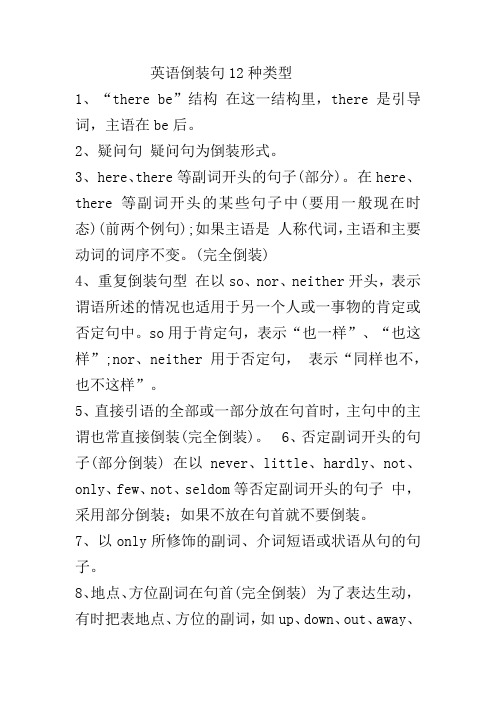
英语倒装句12种类型1、“there be”结构在这一结构里,there是引导词,主语在be后。
2、疑问句疑问句为倒装形式。
3、here、there等副词开头的句子(部分)。
在here、there等副词开头的某些句子中(要用一般现在时态)(前两个例句);如果主语是人称代词,主语和主要动词的词序不变。
(完全倒装)4、重复倒装句型在以so、nor、neither开头,表示谓语所述的情况也适用于另一个人或一事物的肯定或否定句中。
so用于肯定句,表示“也一样”、“也这样”;nor、neither用于否定句,表示“同样也不,也不这样”。
5、直接引语的全部或一部分放在句首时,主句中的主谓也常直接倒装(完全倒装)。
6、否定副词开头的句子(部分倒装) 在以never、little、hardly、not、only、few、not、seldom等否定副词开头的句子中,采用部分倒装;如果不放在句首就不要倒装。
7、以only所修饰的副词、介词短语或状语从句的句子。
8、地点、方位副词在句首(完全倒装) 为了表达生动,有时把表地点、方位的副词,如up、down、out、away、in等放在句首,同时把谓语动词放在主语之前。
若主语为人称代词,主语和谓语动词的位置不变,只将副词放在句首。
(完全倒装)9、虚拟结构中在虚拟结构中,条件从句的谓语含有were、had和should这三个词是,可省去if,将这些词移至主语之前。
10、as引导的让步状语从句 as引导让步状语从句时要倒装(形容词/副词/名词/动词+as+主语+谓语)。
11、祝愿的句子用于某些表示祝愿的句子里。
12、So+形容词、副词及such置于句首时。
英语语法结构倒装句

英语语法结构--倒装句倒装句是英语语法中的一种结构,指的是将句子中的主语和谓语的位置颠倒,即将谓语置于主语之前。
倒装句在英语中使用频率较高,常用于强调、表示条件、表示地点和时间等情况下。
以下是关于倒装句的详细介绍。
一、完全倒装句完全倒装句是指将整个谓语放在主语之前,常见的结构有:1."助动词/情态动词 + 主语 + 谓语" 例如:•Can you swim? (你会游泳吗?)•Will she come tomorrow? (她明天会来吗?)•Should we start now? (我们现在应该开始吗?)•Had I known the truth, I wouldn't have gone. (如果我知道真相,我就不会走了。
)2."状语 + 动词 + 主语" 例如:•In came the teacher. (老师走了进来。
)•Out rushed the students. (学生们冲了出去。
)•Up went the balloon. (气球飘了上去。
)•Down fell the rain. (雨下了下来。
)3."there be" 结构的倒装例如:•There is a book on the desk. (桌子上有一本书。
)•There are many people in the park. (公园里有很多人。
)•There was a loud noise outside. (外面传来一声巨响。
)•There will be a meeting next week. (下周将有一次会议。
)二、部分倒装句部分倒装句是指将谓语中的助动词或情态动词放在主语之前,常见的结构有:1."助动词/情态动词 + 主语 + 不完全动词" 例如:•Did you see the movie? (你看过那部电影吗?)•Does she like ice cream? (她喜欢冰淇淋吗?)•Can I borrow your pen? (我可以借你的笔吗?)•Should we go now? (我们现在应该走吗?)2."情态动词 + 主语 + 动词" 例如:•Can you swim? (你会游泳吗?)•Will she come tomorrow? (她明天会来吗?)•Must he finish the report today? (他必须今天完成报告吗?)•Should we start now? (我们现在应该开始吗?)3."副词 + 助动词/情态动词 + 主语 + 动词" 例如:•Never have I seen such a beautiful sunset. (我从未见过如此美丽的日落。
英语的倒装句句条件初中

英语的倒装句句条件初中英语的倒装句有以下几种情况:1. 完全倒装:将助动词或情态动词放在主语之前,构成完全倒装结构。
如:- Never have I seen such a beautiful sunset. 我从未见过这么美丽的日落。
- Rarely do we have the opportunity to travel abroad. 我们很少有机会出国旅游。
- Not only is he intelligent, but he is also hardworking. 他不仅聪明,而且勤奋。
2. 部分倒装:把谓语动词中的一部分放在主语之前,构成部分倒装结构。
如:- Hardly had she finished her work when the boss came in. 她刚刚完成工作,老板就进来了。
- Under no circumstances should you give up. 在任何情况下都不应该放弃。
- With a smile on his face, Tom walked into the room. 汤姆脸上带着微笑走进房间。
3. 带有否定意义的副词或短语放在句首时的倒装:如:- Never before have I tasted such delicious food. 我从未尝过这么美味的食物。
- Little did he know that he was going to be fired. 他并不知道自己即将被解雇。
- Seldom have I seen such a kind-hearted person. 我很少见到如此善良的人。
注意:主语必须是名词或代词,不能是动词-ing形式或不定式。
同时,在倒装句中,一般情况下要将情态动词或助动词放在主语之前,只有实义动词才能放在主语之后。
英语倒装句的九种分类讲解

之相礼和热创作英语倒装句的九种分类讲解为了强调或均衡句子结构,英语中经常运用倒装.倒装有全部倒装和部分倒装.全部倒装是指将句子中的谓语动词全部置于主语之前.部分倒装是指将谓语的一部分如助动词或神态动词置于主语之前.假如句中的谓语没有助动词或神态动词,则需添加助动词do,does或did等,并将其置于主语之前.现将倒装句分类讲解如下:1. 以here,there,now,then等地点或工夫副词扫尾的句子,谓语动词是be, come, go, remain等,而主语又是名词时,用全部倒装.留意:假如句子的主语是代词时,则不倒装.如:Here comes the bus!/ Here it comes!2. 有些动词与副词out,in,up,down,away等构成不及物动词短语.为了使句子更生动,常将这些副词提早到句首,这时用全部倒装.留意:句子的主语是代词时,则不倒装.如:Up went the rocket. / Up it went.3. 将暗示地点的介词短语放在句首进行强调时,运用全部倒装.谓语动词常为不及物动词.如: From the window came t he sound of music.4. 当句子主语部分较长,谓语部分较短,或为了强调句子的表语时,常运用全部倒装.句子的结构为“表语+系动词+主语”.如: Gone are the days when we had nothing to eat.5. if虚拟条件状语从句中,假如将连词if省略,需用部分倒装.如:Were I you, I would go there.6. as引导的退让状语从句的倒装有如下几种方式:1) 从句的谓语部分为“不及物动词+副词”时,常将此副词提早到从句句首.如:Hard as you try, you will not succeed.2) 从句的谓语部分为“神态动词+不及物动词”时,常将此动词提早到从句句首.如: Wait as you may, he will not see you.3) 从句的谓语部分是“系动词+描述词”时,常将此表语描述词提早到从句句首.如: Proud as the nobles are, they are afrai d to see me.4) 从句的谓语部分是“系动词+单数名词”时,则常将这个表语提早,但要省略名词前的不定冠词.如: Child as he is, he can tell right from wrong.7. 具有(半)否定意义的词或短语位于句首时,用部分倒装.如:seldom, rarely, not, never, by no means, in no time, hardly... when, no sooner...than, not only...but also等.如: Not only doe s he do well in his lessons, but also he often helps others with th eir lessons.8. “only+状语”位于句首时, 用部分倒装.如:Only then did I k now the importance of English.9. so...that结构中,偶然要强调so所修饰的描述词或副词,常将so 连同它所修饰的描述词或副词一同提早放在句首.如: So bright was the moon that the flowers seem as bright as by day.英语语法倒装句之部分倒装部分倒装是指将谓语的一部分如助动词或神态倒装至主语之前.假如句中的谓语没有助动词或神态动词,则需添加助动词do, does或did,并将其置于主语之前.1)句首为否定或半否定的词语,如no, not, never, seldom, little, hardly, at n o time, in no way, not until… 等.Never have I seen such a perfo rmance.Nowhere will you find the answer to this question.Not u ntil the child fell asleep did the mother leave the room.当Not until引出主从复合句,主句倒装,从句不倒装.留意:如否定词不在句首不倒装. I have never seen such a per formance. The mother didn't leave the room until the child fell a sleep.典型例题1)Why can't I smoke here?At no time___ in the meeting-roomA. is smoking permittedB.smoking is permittedC. smoking is it permittedD.does smoking permit答案A. 这是一个倒装成绩.当否定词语置于句首以暗示强调时,其句中的主谓须用倒装结构.这些否定词包含no, little, hardly, seldo m, never, not only, not until等.本题的正常语序是 Smoking is permitted in the meeting-room at no time.2) Not until the early years of the 19th century ___ what heat i s.A. man did know B. man know C. didn't man know D. did man know答案D.看到Not until…的句型,我们晓得为一倒装句,答案在C,D 中选一个.改写为正常语序为,Man d id not know what heat is until the early years of the 19th. 如今将not提早,后面就不克不及再用否定了,否则意思就变了.倒装句讲解和练习英语句子通常有两种语序:一种主语在前,谓语在后,称为自然语序,另一种谓语在前,主语在后,称为倒装语序按“主语+ 谓语” 这种顺序陈列的句子是陈述语序.假如陈列顺序变成“谓语(或谓语一部分)+主语”,就是倒装.倒装句分为:一、部分倒装就是把谓语中的be动词、助动词或神态动词置于主语后面.稀有于下列几种状况:(一). only所修饰的副词,介词短语或状语从句放在句首时,要用:only+ 状语+ be /助动词/神态动词+主语及其他Only when he told me the news did I know wh at had happened.Only in this way can you make progress in your English.留意:only修饰主语时,不必要倒装.1.Only in this way ________to make improvement in the operating system. A. you can hope B. you did hope C. can you hope D. did you hope(二).含有否定意义的副词或连词放在句首时.如:never, little, seldom, not, not only, not until, no sooner (…than), hardly (...when), rarely, scarcely, in no way等.We seldom get up at f our in the morning.= Seldom do we get up at four in the mornin g.Not a single word from him could the enemy drag.Rarely have I heard of such a silly thing.(1)hardly...when; scarcely...whe n...; no sooner...than... 可以用正常语序 had hardly done whe n... did 或用倒装句式Hardly had + 主语+ done when (i)句式.hardly所在的句子用过往完成时.The bell hardly had run g when the class began.= Hardly had the bell rung when the clas s began.No sooner had he arrived in Beijing than he began to wo rk.(2)not only… but also 如连接两个成分时,不必倒装;连接句子时,后面的句子要用倒装.Not only was everything that he had taken away from him, but also his German citizenship.N ot only is he busy, but also I have a lot of work to do.Not only d oes he speak English very well, but also he speaks French well. 2.I finally got the work I dreamed about. Never in all my life_ _______ so happy! A. did I feel B. I felt C. I had felt D. had I fel t3.Not until I began to work ________how much time I had w asted. A. didn't I realize B. did I realize C. I didn't realize D.I realized 4.No sooner___ than it began to rain heavily.A. thegame began B.has the game begunC. did the game begin D.ha d the game begun(三).在so…that, such…that句型中,若把so, such引导的结构放在句首时.So frightened was he that he did not dare to move an inch.5.So difficult _____it to live in an En glish-speaking country that I was determined to learn English w ell. A. I've felt B have I felt C. I did feel D. did I feel(四).省略了if的虚拟条件句中,把were, had或should放在句首时.If I were you, I would take the job. = Were I you, I would take the job.6.________it rain tomorrow, we would have to put off the visit to Yangpu Bridge.A. Were B. Should C. Would D. Will(五).把副词so放在句首,暗示后面所说的状况也适用于另一个人或物.I like reading English, so does he. (六).把neit her, nor放在句首,暗示后面的否定内容也适用于另一个人或物. If you won't go, neither will I.7.-I don't think I can walk a ny further. -________, let's stop here for a rest. A. Neither and I B. Neither can I C. I don't think so D. I think so(七)用于描述词/副词/名词/动词+as (though)引导的退让状语从句中.留意:当表语为名词时,则名词前不加任何冠词;主谓其实不倒装.Try hard as he will, he never seems able to do the worksatisfactorily.Child as he is, he knows a lot.8.________, I have never seen anyone who's as capable as John. A. As long as I ha ve traveled B. Now that I have traveled so muchC. Much as I have traveled D. As I have traveled so much(八).由howe ver, no matter how引导的退让状语从句中,把however+描述词/副词,no matter how+描述词/副词放在句首时.9.____ ____, mother will wait for him to have dinner together. A. Howe ver late is he B. However he is late C. However is he lat e D. However late he is二、全部倒装就是把整个谓语部分放在主语之前.留意:谓语动词的数要与后面的主语坚持同等.稀有于几种状况:(一).用于地点副词here, there,方位副词out, in, up, down及工夫副词now, then等扫尾的句子里,以示强调.There goes the bell. Look! Here they come. 这种倒装要求:主语必须是名词.主语是人称代词时,主语和谓语语序不变.Here it is.Away he went.这类倒装句式一样平常只用一样平常如今时和一样平常过往时.Here comes the bus.Out rushed the boys.(二).当暗示地点的介词短语放句首时.留意:谓语多为be, lie, sit, stand, come, walk等不及物动词;倒装时不必要助动词. Under the table are three white cats.In front of the tower flews a stream.10.Under a big tree ________, half asleep.A. did sat a fat manB. a fat man satC. did a fat man satD. sat a fat man(三)there放在句首时,要用倒装句式.在“there + be”结构中的谓语动词偶然不必be , 而用暗示类似“存在”观念的其他不及物动词.如:live, stand, come, lie, flow, enter, rise 和appear 等.There came shouts for help from the river.There lies a large wheat field in front of the house.Many years ago there lived an old man in the wooden house.(四).表语置于句首时,倒装结构为"表语+系动词+主语".(1)描述词+系动词+主语Present at the meeting was Mr. Green, a headmaster.(2)过往分词+系动词+主语Hidden behind the door were some naughty children.Gone forever are the days when the Chinese people had to use f oreign oil.(3)介词短语+系动词+主语In front of the playground is a newly-built house.(五).偶然由于主语较长,谓语很短,为坚持句子均衡,或为了强调表语或状语,或使上下文紧密衔接时.They arrived at a house, in front of which sat an old man. (六).在一些暗示祝福的句子里.Long live the Communist Party of China!May you all be happy.答案 1—5 CDBDD 6—10 BBCDD 巩固练习1._______ and caught the mouse.A. Up the cat jumpedB. The cat up jumpedC. Up jumped the catD. Jumped up the cat2.______ and the lesson began.A. In came Mr BrownB. Mr Brown in cameC. In came heD. came in Mr Brown3. Over _______ , dead.A. rolling the goatB. rolled the goatC. did the goat rollD. the goat rolled4.—Where is my shirt, mum?—_________.A. There is itB. There it isC. There isD. Here is it5. —Where is your father?—Oh, ________.A. here he comesB. he here comesC. here does he comeD. here comes he6. The door opened and there ________ .A. enters an old manB. entered an old manC. did an old man enterD. an old man entered7. Now ______ your turn to recite the text.A. will comeB. comesC. has comeD. there is8. Often _____ them not to smoke here.A. we advisedB. advised meC. did we adviseD. had we advised9.________ playing soldiers.A. Inside the room were two boysB. Inside the room two boysC. Were two boys inside the roomD. Inside the room was two boys10. On the wall _______ two large portraits.A. are hangingB. hangedC. hangD. hangs11._______ who was wounded in the stomach.A. Among them were a soldierB. Among them was a soldierC. Among them a soldier wasD. Among they was a soldier12. Next door to ours ________ , who is no less than eighty.A. that lives an old manB. does an old man liveC. lives an old manD. where lives an old man13.She plays the piano very well, ______.A. so every one of us doesB. every one of us doesC. so does every one ofusD. so do every one of us14.You say he works hard, ______, and _____.A. so he does; so you doB. so he does; so do youC. so does he; so do youD. so does he; so you do15. —I thought you women were present at the meeting.—__________.A. So we wereB. So we didC. So were weD. So did we16.I don’t think Jack will come t oday, _____.A. nor will MaryB. and Mary doesn’tC. Mary will eitherD. or Mary does17. She is fond of cooking, _____I .A. so amB. nor amC. neither doD. nor do18.Marx was born in Germany and German was his native langu age .A. So it was with AnglesB. So was it with AnglesC. So was AnglesD. So did Angles19.A fish needs water and without water it will die._______.A. So does a manB. So will a manC. So it is with a manD. So is it with a man20. So absorbed _______ the work that she often forgot to ____ _ her meals.A. had she been in; doB. she was in; makeC. was she in; takeD. she had been in ; have21.So loudly ______ that every one of the class could hear him.A. did he speakB. did he spokeC. spoke heD. he spoke22. __________ his appearance that no one could recognize him.A. Strange so wasB. So strange wasC. Was so strangeD. So was strange23.Not once ______ their plan.A. did they changeB. they changedC. changed theyD. they did change24. Never ______ such a wonderful place as Hangzhou.A. are seeingB. had I seenC. I have seenD. have I seen25.Seldom ______ TV during the day.A. they watchB. are they watchingC. have they watchedD. do they watch26.Nowhere ______ as in my garden.A. the flowers were so beautifulB. were the flowers so beautifulC. so beautiful were the flowersD. so beautiful the flowers were27. Hardly ________ his homework when he went out.A. finished heB. he had finishedC. did he finishD. had he finished28.Scarcely _____ finished their homework ______ I came into the classroom.A. had they; thanB. they had; whenC. had they; whenD. did they; when29. Not only _______ a promise, but also he kept it.A. has he madeB. does he makeC. he made D. did he make30. Not until his comrades criticized him _______ to admit his mistake.A. had he begunB. began heC. did he beginD. does he begin答案 1—5 CABBA 6—10 BBBDA 11—15 BCC BA 16—20 BAACC 21—25 ABADD 26—30 BDCDC。
英语倒装句的四种基本句型例句

英语倒装句的四种基本句型例句嗨,小伙伴们!今天咱们来好好唠唠英语倒装句的四种基本句型,这可真是英语学习里超有趣的一部分呢。
就像一场奇妙的语言魔术,让句子变得超级有特色。
**一、完全倒装(Full Inversion)**完全倒装就是把整个谓语动词都放到主语之前啦。
这就好比是把一场演出的主角(主语)和配角(谓语)的出场顺序完全颠倒了一下,给人一种很新奇的感觉。
例句1:There goes the bell.(铃响了。
)你看,正常的语序应该是The bell goes there. 但是这样一倒装,就有一种突然性,就像你正等着什么事情发生,然后“铃就响了”,这种表达更加生动。
我还记得我刚学这个的时候,我同学问我:“为啥要这么说呀?直接说The bell goes there不就得了?”我就跟他说:“哎呀,这就像你去看魔术表演,魔术师要是按平常的方式出牌,那还有啥惊喜呢?这种倒装句就像魔术里的大变活人,突然把主语和谓语的位置变了,让句子变得超酷。
”例句2:Here comes the bus.(公共汽车来了。
)想象一下,你在车站等车等得心急火燎的,然后你大喊一声“Here comes the bus”,是不是感觉比“The bus comes here”更带感呢?这时候句子就像是一个充满活力的小助手,快速地把重要的信息“bus来了”传达给你。
例句3:Away flew the birds.(鸟儿飞走了。
)这个句子要是正常说就是The birds flew away. 可一旦倒装,就像是我们在描述一个很突然的画面,鸟儿“嗖”的一下就飞走了,那种动态感更强了。
我跟我的英语老师讨论这个句子的时候,老师说:“你看,这种倒装就像是给句子加了个加速器,让动作更迅速地呈现在读者或者听者的脑海里。
”我当时就觉得,哇塞,真的是这样呢!**二、部分倒装(Partial Inversion)**部分倒装呢,就是只把助动词、情态动词或者be动词放到主语前面,主要动词还在主语后面呢。
- 1、下载文档前请自行甄别文档内容的完整性,平台不提供额外的编辑、内容补充、找答案等附加服务。
- 2、"仅部分预览"的文档,不可在线预览部分如存在完整性等问题,可反馈申请退款(可完整预览的文档不适用该条件!)。
- 3、如文档侵犯您的权益,请联系客服反馈,我们会尽快为您处理(人工客服工作时间:9:00-18:30)。
英语倒装句的几种情况按“主语+ 谓语” 这种顺序排列的句子是陈述语序。
如果排列顺序变为“谓语(或谓语一部分)+主语”,就是倒装。
倒装句分为:完全倒装:整个谓语移至主语前面叫完全倒装。
部分倒装:只把助动词、系动词或情态动词放在主语之前叫部分倒装。
一.完全倒装1. There be + 主语+地点。
另外,在此结构中可以用来代替be动词的动词有:exist, seem, happen, appear, rise, stand等。
如:There stood a dog before him.There are many different kinds of mooncakes on the table .2.Here, There, Now, Then + come (或be等) + 主语" 结构。
主语是人称代词时,不必倒装。
There是引导词,本身没意义。
There comes the bus.Then came the day we are looking forward to.**Here you are! There they come!**3. 表示方位的副词或短语out, in, up, down,away放在句首,后面一般使用倒装语序。
这种句子的为主动词通常为go, come, rush, fly ,fall.. 主语是人称代词时,不必倒装。
In came our teacher.4. 表示地点的介词短语(如on the wall, under the tree, in front of the house, in the middle of the room等)放在句首时,要全部倒装。
如:On the top of the hill stands a pine tree.In front of the classroom is a playground.5. 如果直接引语后注明是什么人说的,而且主语是名词时,需要完全倒装;主语是人称代词时,一般不用倒装。
“Let”s go ! ”said the captain .“Take off your boots !” ordered the guard .二.不完全倒装6. 用于so开头的句子,表示重复前面相同的内容,意为“也怎么样”。
另外,在结果状语从句句型so …that …中,如果强调so…放在句首,主句需要部分倒装。
句型如下:so +形容词/副词+be/助动词/情态动词that +从句。
I often go out for a walk after supper . So does she .So excited was she at the news that she couldn”t say a word .7. 用于nor , neither 开头的句子,表示重复前面相同的内容,“也不…”。
Li Lei can”t answer the question . Neither can I .If you don”t wait for him , nor shall I .8.在含有no的短语出现在句首时,用部分倒装。
如:at no time, by no means(决不), in no way(决不,一点也不), in no case, under no circumstance(无论如何) 等。
In no way can they smoke in the office.Under no circumstance do we give up our confidence,9.方式状语thus, 频度状语many a time(多次,常常), often, always, once, long, next, now and then,every other day 等放在句首时。
Often have we persuded her not to smoke.Many a time have I seen the girl dancing in the room.10. only放在句首,强调状语(副词,介词短语或状语从句等),全句语序要部分倒装。
Only in this way can we get in touch with them .Only because he was ill was he absent from school .注意:only放在句首,强调主语时,语序不必倒装。
Only Mr Wang knows about it .9. 带有否定意义的词放在句首,语序需要部分倒装。
常见的词语有:not , never , seldom , scarcely , barely , little , at no time , not only , not once , under on condition , hardly … when , no sooner …than ……等。
Little did I think he is a spy .Hardly had I reached home when it began to rain .No sooner had I entered the room than the phone rang .10. 在虚拟语气中,倒装代替条件。
Should he be here next week , he would help us with the problem .Were there no light , we could see nothing .11. 用于某些表示祝愿的句子。
May you succeed ! May you have a good day!练习:after liberation___ to be treated as human beings.they begin B. they had begun did begin D. had they begunonly ___to stay at home, but he was also forbidden to see his friends.was forcing B. he was forced he forcing D. was he forceduntil his father was out of prison to school. _______.John go B. John can go C. could John go D. John could gobefore __seen such a stupid man.I B. was I C. have I D. shall I___about such a silly thing.I heard of B. I have heard of have been hearing of D. have I heard from___about his own health though he was very ill.cared B. did he care C. does he care D. he cares___him recently.met B. I have met C. have I met D. didn't I meet____down ___he stepped in.I sat …than B. I had sat …when I sat …then D. had I sat…whensooner___asleep than she heard a knock at the door.A. she had fallenB. had she fallenC. she had fellD. had she felldid not see Smith. _____A. Neither did IB. Nor didn't IC. Neither I didD. So didn't Idon't know how to swim, ____.A. and my sister doesn't neitherB. nor my sister canC. nor does my sisterD. and my sister does either12 ---You ought to have given them some advice.---_____, but who cared what I said?A. So ought youB. So I oughtC. So did youD. So I did13. –It was hot yesterday. _____.A. It was soB. So was itC. So it wasD. So it did14. She's passed the test. ____.A. So am IB. So have IC. So I haveD. Also I havelike football very much. ______.A. So do IB. It is the same with meC. I do tooD. So I do16. ____, he is honest.A. As he is poorB. Poor is heC. Poor as he isD. Poor as is he17. _____, he knows a lot of things.A. A child as he isB. Child as he isC. A child as is heD. Child as is he18. _____, you can't lift yourself up.A. Even you're strongB. Strong as you areC. How strong you areD. In spite you're strong carelessly___ that he almost killed himself.A. he drivesB. he droveC. does he driveD. did he drivein the day____ the news ____the enemy were gone.A. come…thatB. came…thatC. comes…thatD. came …whatwhen you realize the importance of foreign languages ___them well.A. you can learnB. can you learnC. you learnedD. did you learn, ____.A. here the bus comesB. here is the bus comingC. here comes the busD. here the bus is coming23. “Where is Kate” “Look, ____. She is at the school gate.”A. there she isB. there is sheC. here you areD. here it is24. Which of the following sentences is correct?A. In the teacher cameB. In did come the teacherC. In did the teacher comeD. in came the teacher____, with a stick in his hand.A. did he rushB. rushed heC. he rushedD. he did rushII.句型转换改写下列各句,把黑体的副词放在句首,并使主、谓语倒装:1. I have never heard a speech as exciting as this._____________________________________________________________________ 2. The mark was so small that I could hardly see it._____________________________________________________________________ 3. I hardly turned off the light when my brother came in._____________________________________________________________________ 4. It has at no time been more difficult for us to pass the examination._____________________________________________________________________ 5. We can succeed only in this way._____________________________________________________________________ 6. He did not speak a word at the meeting._____________________________________________________________________ 7. Mary not only complained about the food, but also refused to pay for it._____________________________________________________________________ 8. She had no sooner begun to speak than I sensed that something was wrong._____________________________________________________________________ 9. Mike has helped me with my English many a time._____________________________________________________________________ was a sudden gust of wind and his hat went away。
